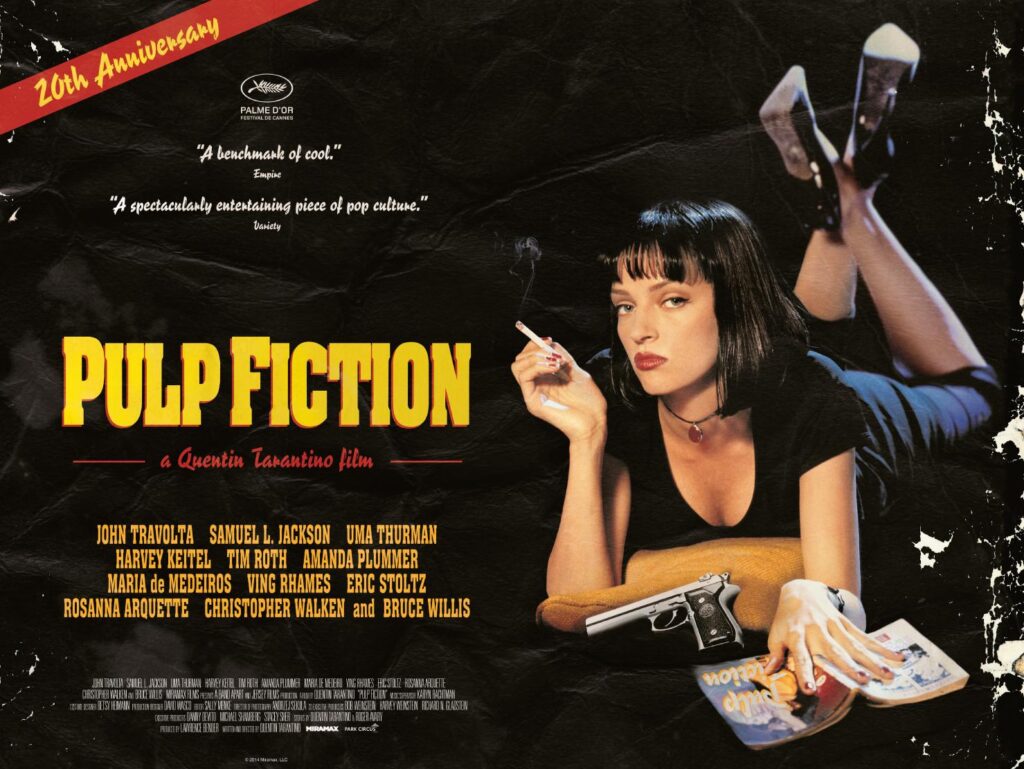
Pulp Fiction, directed by Quentin Tarantino, is a landmark film that has left an indelible mark on cinema since its release in 1994. Known for its non-linear narrative, sharp dialogue, and rich character development, the film weaves together multiple storylines centered around the Los Angeles criminal underworld, offering a gritty yet stylistic portrayal of violence, redemption, and the mundane intricacies of life.
The film features an ensemble cast, including John Travolta as Vincent Vega, Samuel L. Jackson as Jules Winnfield, Uma Thurman as Mia Wallace, and Bruce Willis as Butch Coolidge. Each character’s story intertwines with others in unexpected ways, creating a tapestry of events that are both entertaining and thought-provoking.
One of the film’s most iconic segments is the conversation between Jules and Vincent, who discuss everything from the nuances of fast food in Europe to the concept of foot massages. These dialogues, filled with Tarantino’s signature wit, serve to develop their characters and elevate the seemingly trivial to profound heights. The chemistry between Jackson and Travolta adds a layer of charm to their dynamic, making their philosophical debates memorable.
The film’s structure is non-linear, jumping back and forth in time to present different perspectives on key events. This approach not only keeps viewers engaged but also allows for deeper character exploration. One of the standout stories is that of Mia Wallace, who becomes the catalyst for Vincent’s character arc. The infamous dance scene at Jack Rabbit Slim’s, where Vincent and Mia compete in a twist contest, has become iconic, showcasing Tarantino’s ability to blend pop culture with narrative artistry.
Tarantino’s direction is complemented by a unique soundtrack that mixes classic hits with original score pieces, enhancing the film’s atmosphere and emotional impact. The eclectic music choices not only set the mood but also become characters in their own right, enriching the overall experience.
Violence is a recurring theme in Pulp Fiction, yet it is portrayed with a certain stylistic flair that challenges traditional cinematic depictions. The juxtaposition of brutal violence with dark humor creates a sense of discomfort, prompting viewers to reflect on the nature of violence and morality in society. The film raises questions about fate, chance, and the consequences of one’s actions, encapsulated in the character of Jules, who undergoes a transformation influenced by a near-death experience.
The film culminates in an unforgettable climax that ties together the various narratives while leaving some questions unanswered, reinforcing the idea that life is unpredictable and often lacks resolution. Tarantino’s ability to blend various genres—from crime thriller to dark comedy—has influenced countless filmmakers and redefined modern cinema.
In conclusion, Pulp Fiction (1994) stands as a revolutionary film that challenges conventional storytelling and character development. With its memorable dialogue, complex characters, and stylistic approach to violence, it remains a cultural touchstone that continues to resonate with audiences. Tarantino’s masterful direction and the film’s impact on the cinematic landscape solidify its place as one of the greatest films of all time.




